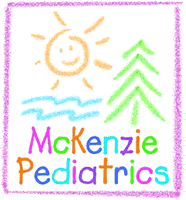Alcohol Use in Youth and Adolescents
McKenzie Pediatrics 2012
Alcohol use continues to be a major problem from pre-adolescence through young adulthood in the United States, despite that the minimum legal drinking age across the nation is 21 years. Some children begin hazardous alcohol consumption during their middle school years, and the prevalence of problematic alcohol consumption continues to escalate into late adolescence and young adulthood.
There is abundant research about the harmful effects of alcohol on adolescent brain development. Moreover, alcohol abuse should always be seen as a potential sign of other substance abuse. Finally, use of alcohol at an early age is associated with future alcohol-related problems both with health and behavior, including a greater risk of criminal behavior.
The earlier the exposure, the worse things can become. For those 12 years or younger at first alcohol use, the prevalence of lifetime alcohol dependence is 40 percent, whereas those who initiated at 18 years have a 17 percent risk, and those who initiated at 21 years have an 11 percent risk.
Earlier alcohol initiation is associated with greater risks of:
Sexual risk-taking (unprotected sexual intercourse, multiple partners, being drunk or high during sexual intercourse)
Sexually-transmitted infections, including HIV (the virus that causes AIDS)
Pregnancy
Academic problems and school drop-out
Other substance abuse (cigarettes, marijuana, harder drugs)
Delinquent behavior in adolescence and young adulthood
Criminality and possibly violent behavior
How common is alcohol use in children and teens? In a national study:
The prevalence of being drunk at least once within the past month is 5 percent for 8th-graders, 16 percent for 10th-graders, and 27 percent for 12th-graders.
The prevalence of ever having tried an alcoholic drink is 50 percent for 8th-graders, and 75% for 11th- graders
Binge drinking (the consumption of three or more drinks in a row in a middle-school aged student, five or more in a row in a high-school aged student) was reported within the past month in 8 percent of 8th-graders, 19 percent of 10th-graders, and 27 percent of 12th-graders.
29 percent of high-school students report having ridden 1 or more times in the past month in a vehicle driven by someone who had been drinking alcohol; 10 percent reported having driven when they had been drinking alcohol.
Ninety percent of 12th-graders (and 60 percent of 8th-graders) report that alcohol is fairly easy to obtain. This result has been corroborated by multiple additional studies.
What are the health risks of alcohol use in children and adolescents?
Binge drinking (often related to a bet or a dare) may cause alcohol poisoning, which may suppress the gag reflex and the respiratory drive, possibly leading to death
Alcohol use is the #1 contributor to adolescent death from motor vehicle accident, homicide, and suicide
Risk-taking behaviors (assault, sexual risk-taking and its consequences, and other drug use)
Reduced memory skills
Disordered sleep with consequences on school performance
Disordered decision-making
What are the risk factors for experimenting with alcohol at an early age?
Mood disorders (depression, anxiety)
ADHD
Bulimia
Conduct disorders
Schizophrenia
Bipolar disorder
Single-parent household with inadequate supervision
Physical, sexual, or neglectful abuse
Drug and/or alcohol abuse by a parent or older siblings (implies a permissive attitude)
Having friends who use alcohol, cigarettes, or other drugs
Poor school performance, and truancy
Excessive inappropriate media exposure
Finally, how can parents (and physicians) screen their teens for substance abuse? The CRAFFT Screening Questions can help:
C: Have you ever ridden in a Car driven by someone (including yourself) who was high or had been using alcohol or drugs?
R: Do you ever use alcohol or drugs to Relax, feel better about yourself, or fit in?
A: Do you ever use alcohol or drugs while you are by yourself, Alone?
F: Do you ever Forget things you did while using alcohol or drugs?
F: Do your Friends ever tell you that you should cut down on your drinking or drug use?
T: Have you ever gotten into Trouble while you were using alcohol or drugs?
Please let us know if you suspect that your child is abusing alcohol or other drugs. We can help you to find help!

xx-teen


